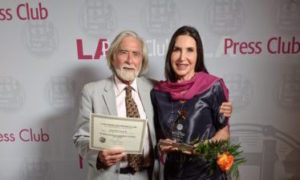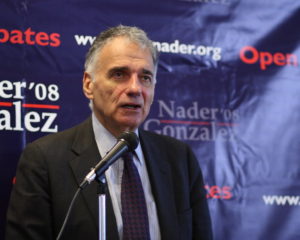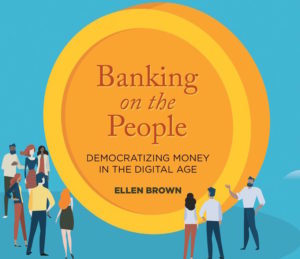Hundreds Gather for Public Banking and Economic Justice
Earlier this month, leading scholars, activists and other concerned people met in San Rafael, Calif., to explore the idea of public banks: democratically run, fiscally transparent institutions designed to serve community stakeholders rather than capital shareholders.
By Matt J. Stannard, Political ContextThis piece first appeared at Political Context.
By any standards, the 2013 Public Banking Conference, held at beautiful Dominican University in San Rafael, California, was a success. In a political world where like-minded groups seldom converge on practical policy blueprints, it was an astounding success. Hundreds of committed attendees–Occupy activists, religious groups, labor, environmentalists, legal activists, journalists and progressive economists–came together for three days of heady conversations and inspiring presentations, and by all accounts, everyone left with something resembling a vision.
Understanding the socioeconomic context under which the Conference took place is useful in seeing why so many leading activists and scholars felt the imperative to attend. Whilecorporate profits soar, municipalities are dying. Governments bail out big banks and leave ordinary people out in the cold. An artificial scarcity permeates the public sector, a product of ideology and grab-and-go capitalism, and the deliberate starving of public services. The city of Philadelphia recently closed 23 public schools–not just failing schools, but successful ones. And, they opened their coffers for a $400 million prison. Budget cuts are making it harder for abused women to leave their abusers. The corporate media, in the words of Buzzflash-Truthout editor Mark Karlin, renders the poor, and really anyone outside of the corporate elite
voiceless, faceless. The reality is that you are not news; your existence is hardly worthy of note, with the obligatory exception of an occasional “gee it’s tough to live like this” profile of a “welfare mom” or person unemployed and looking for work for three or four years.
As far as economics is concerned, it appears that the only persons entitled to speak about financial policy options are those of the privileged class, and particularly those who have been enriched by the current system (including politicians). Add to that at the ever present class of “journalistic punditry,” who if they are on national television (or major market local television stations) de facto belong to the entrenched wealthy.
Public Banking Institute Executive Director Marc Armstrong believes the stakes are higher than they have ever been. “‘Public finance’ has been wholly and completely taken over by private banks in each of our respective governing agencies,” he says. “This takeover has been so complete that no government or quasi-government institution has remained untouched by the investment banks, which use their blood funnel to vacuum up the cumulative interest that drains economies of necessary money supply.”
A consensus is emerging that “the era of Big Finance capitalism” must end–not as an ideological matter, but a practical one, as PBI Conference speakers Margaret Flowers and Kevin Zeese wrote in an essay published yesterday. The question, of course, is what practical steps citizens and collective bodies might take to ensure that the transition is smooth, democratic, and constructive. It is in this larger background that the Conference took place–a time when good people are desperately seeking solutions that are not only practical, but palatable—and not only to ordinary working people, but to the handful of genuinely conscientious people who’ve managed to gain positions of political and cultural leadership in a quite imperfect world.
“What impressed me about the conference was the very rapid growth of the public banking movement,” says Tim Canova, Professor of Law and Public Finance at NOVA Southeastern University and a strong voice for public banking. “I met activists from all corners of the country working at the local level to start public banks in their own communities. This also reflects a growing consciousness of the political importance of credit and the historical role of public banking in efforts to achieve sustainable economic development.”
Public banking is not a new idea. Interest in the creation of state-run banks was spreading nationwide three years ago when John Nichols described the phenomena in the pages of The Nation. And, of course, the Bank of North Dakota has long been a model of sustainable economics in the midst of the chaos created by private capital. “In North Dakota, public debt is financed by its own public bank, allowing for interest to be paid back, in the form of lower taxes or increased public services, to the very people who pay the interest,” says Marc Armstrong. “North Dakotans have thrown off these supposed masters of finance, replacing them with public servants, working for the Bank of North Dakota, to further the interests of their people.”In its simplest manifestation, a public bank is a democratically-run, fiscally transparent bank designed to serve community stakeholders rather than capital shareholders. The profits of public banks are returned to the public, whereas privately owned banks increase taxpayer costs through compound interest and are compelled to return profits to shareholders. Public banks issue credit at low-cost or no-cost to cities and states. Public banks can offer “bridges” to residential, agricultural, and public works financing, as the BND did during the Great Depression. BND also partners with the private sector, encouraging entrepreneurial startups and providing check-clearing, liquidity, and bond account safekeeping to private banks. PBI President Ellen Brown adds:
A new publicly owned bank would have a clean set of books, untainted by the Wall Street addiction to gambling in complex derivatives; and its profits would go back to the local government and community, rather than being siphoned off in exorbitant salaries, bonuses, and dividends. A publicly-owned bank could funnel credit where it is needed most, directly into the local economy.
Although this blueprint for public banks was the guiding vision of the Conference, several complimentary economic themes emerged from the vast array of speakers there. Rabbi Michael Lerner explained the Debt Jubilee movement. Margaret Flowers, Kevin Zeese, David Brodwin, Georgia Kelly, and Arthur Stamoulis held an important forum on the very disturbingTrans-Pacific Partnership, a threat not only to ideas like public banking, but to huge other sectors of public goods. OpEd News founder Rob Kall gave a rousing presentation on the general concept of bottom-up economics, while speakers like Gar Alperovitz and David Cobbshared their visions linking ideas like public banking to the larger vision of a participatory, sharing-oriented economy. Space and time do not permit a comprehensive review of the Conference, but Leilani Clark’s very accessible treatment of the Conference at Bohemian.comis worth reading. And interested wonks may read the entire Conference program here.
Rolling Stone economic crusader Matt Taibbi was perhaps the highest profile guest at the Conference. He joined Icelandic parliamentarian Birgitta Jonsdottir, PBI President Ellen Brown, and Alperovitz in a thoughtful discussion on the relationship between the corruption of the private financial sector and the promise of public solutions. He also made himself available forinterviews before and after that discussion. Last month, I had expressed some hope that, after attending the conference, Taibbi would move from criticizing big banks to endorsing public banking. During our walk to a reception on the day of Taibbi’s attendance, a few friendly conference attendees quietly explained to him the mechanics of the idea (although I’m sure he already knew a great deal about it). Discussions continued through the reception and after the public discussion that evening, and he seemed excited to be among so many like-minded folks, and genuinely reluctant to leave. His post-conference tweet demonstrated that he was sold on the idea. “Want to thank all the folks from the Public Banking institute for the event last night,” he tweeted. “- amazing time – an idea whose time has come.”
In between speakers, the PBI media team interviewed both attendees and movement leaders. The interviews and speeches were webcast by the Community Media Center of Marin team, and according to that organization’s director, hundreds watched the webcasts from their home computers.
Soft-spoken but surgically analytic, PBI President Brown was the intellectual center of the Conference. Brown’s work has been instrumental in building awareness of the economic and legal facets of public banking. This interview with Brown is informative, as were her presentations at the Conference. Brown continues her prolific work in an article published last week at Counterpunch, where she takes on the student loan crisis from a decidedly egalitarian (and practical) perspective:
Other countries make loans available to their students interest-free. For more than twenty years, the Australian government has successfully funded students by giving out what are in effect interest-free loans. They are “contingent loans,” which are repaid only if and when the borrower’s income reaches a certain level. New Zealand also offers 0 percent interest loans to New Zealand students, with repayment to be made from their incomes after they graduate.
Brown’s website is also up now for book orders for her new book, which premiered at the Conference, The Public Bank Solution.
Although participants left the Conference with a lot of inspiration and satisfaction, there was also wide recognition that more building remains to be done. “I believe we need to engage a larger diversity of people and especially younger people in discussions about how public banking would address the challenges in their own lives and their own communities,” Canova told me. “We also need to recognize that we are part of a much larger democracy movement that goes well beyond banking. The financial crisis and sick economy have revealed the rot in our politics, law, and institutions. It has revealed that we have a broken democracy. The public banking movement must be at the vanguard of the movement to restore our democracy.”
Of course, there will be more PBI events in the future, and public banking is on the agenda at other conferences, such as GreenFest 2013, to be held Sept. 7-8 in Middlebury, Connecticut. Meanwhile, the real test will be whether interest in public banks continues to spread around the country, and whether activists can translate vision into genuine policy. New York Assemblywoman Sandy Galef recently proposed a state bank for New York, while other proposals continue to emerge, and strong voices continue to push for the idea to explode in the public fora.
Your support matters…Independent journalism is under threat and overshadowed by heavily funded mainstream media.
You can help level the playing field. Become a member.
Your tax-deductible contribution keeps us digging beneath the headlines to give you thought-provoking, investigative reporting and analysis that unearths what's really happening- without compromise.
Give today to support our courageous, independent journalists.






You need to be a supporter to comment.
There are currently no responses to this article.
Be the first to respond.